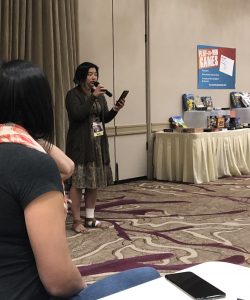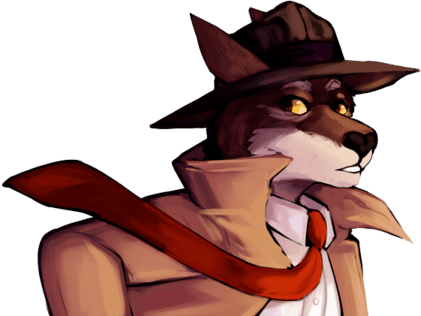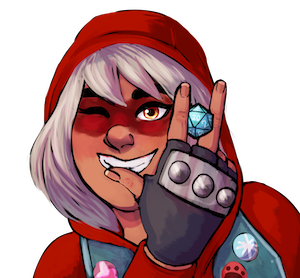Jeeyon Shim's Keynote Speech
On Thursday evening, the welcoming the welcoming ceremonies kicked off and Jeeyon Shim gave this beautiful keynote speech.
For those of you who don’t know me, my name is Jeeyon Shim. I write games. I also teach as an outdoor educator, my main focus being traditional survival skills and stewardship, and I primarily teach children. I will be speaking to you about my feelings on stewardship, courage, and joy, and the vital place these values have here in our community and beyond it.
When you work with children one of the first things you learn are your own limits in the face of the unknown. When you work outdoors, one of the first things you learn is that if you do not adapt to the unknown you will be at its mercy. In my experience working with both children and the outdoors, I’ve learned that the best thing you can do for your own peace of mind and the quality of your teaching is to plan, sure, and then let all your expectations float away, because no matter how meticulously you lay out the day’s program all it takes is, say, a single wasp to undo everything you’ve worked for. Change is the only constant.
And I feel like we are all embodying that spirit of adaptability here this weekend, in the best of ways. The convention has barely started and already this entire community rallied together in the face of unforeseen circumstance to show up for each other. The power outage turned out to be utterly mangeable, and while the prospect of its worst case scenario was not one to savor and I am grateful to not play it out, there is a part of me that was delighted to see how ready and eager all of us are, in the face of crisis, to steward this space, to steward ourselves, and to steward this beautiful group of people who are all here out of love for our collective imagination and creative power.
To me, stewardship means — above all else — acting in service to the whole. We act as stewards when we recognize that we are a single part of rich, complex, balanced systems; and that our own idea of what it means to be helpful needs to be tempered by truth: through learning the true needs of those systems, the true nature of things, including each other, including ourselves, it is only through that process that we are able to live through stewardship.
When European colonizers first arrived in California from Spain, they referred to the land as an Eden, they saw indigenous communities as innocents wandering in to the gardens of God. What they did not see, refused and could not see, was that the bounty and abundance of the land was the result of generations of indigenous communities actively tending, pruning, symbiosis and coexistence passed down through mentorship and experience from one set of elders to the young, and so on and so on, until the line was violently severed. The fires that now dictate our seasons here are the direct descendant of colonization, and while they are an extreme example of what can happen when values of stewardship are cast aside, I cannot help but think of it now, thinking about how the threat of those fires could have impacted our lives for the next three days.
You cannot tell a child, “Be a good steward,” and expect to get anything fruitful from them. Instead you must say, “When you eat, make sure you do not leave anything behind. When you run in play, make sure you trample no nests underfoot. When you rest, make sure you know where I am, that you may find me once you feel better.” When you work with children you have to break down complex processes into every constituent part. I think that is worth remembering over the next three days.
Fundamentally, I think all the skills I teach, and try to weave into my work here, focus on two core states: courage and joy.
Courage is the resolve to face the world and move forward without the reassurance of a satisfying or happy ending. We are as a culture trained to seek and create tidy narrative arcs. One of the first skills I teach when I incorporate storytelling into my curriculum for the very young ones is to look for the three acts of any story: beginning, middle, and end. Then these poor kids have to spend the next twenty years learning that that’s all a lie, because everything happens in cycles. The last card of the major arcana in the Tarot is the World, a symbol of all-encompassing rhythms of change. If you’re constantly trying to craft a happy ending not only will you be disappointed but you won’t see the truth. Even if you’re looking at the scene of a kill site, the point where a hunter found and captured its quarry, is that where that story ends? Or is there sign of the hunter bringing the food back to its den? Are there signs of young? What is the hunter nurturing through the end of the quarry’s life? What other stories are beginning as that one ended?
Bear with me here. I teach children many, many traditional land skills, and one of my favorites is track and sign, the skill of reading various indications of the presence of animals. I especially love to teach children tracking because I am still quite bad at it, and the reason I’m bad at it is that I love telling stories. I have an intensely pattern-seeking mind, and it is easy to look at a track and create the vision of, say, a wolf stalking through the brush. But tracking doesn’t care about the story you want: tracking well relies on accepting that you must look at the information in front of you and take it as it is, incorporate it into your understanding, learn to read the true story in front of you instead of the one you desire; admit your own ignorance when you don’t know. As much as I might want to see the story of that wolf, most of the time the track I’m looking at belongs to a domestic dog. And, the beauty of tracking is that even if I don’t get what I want, that doesn’t mean that the process of learning to read the story in the land around me isn’t a delight in itself. In that way, tracking builds the ability to embark on a journey that, even without a pretty outcome, is worth the travel; it builds the foundations of courage. I want us to remember that as we go through this weekend. It is all too easy, in an environment of high expectations, to set ourselves up for the disappointments of resolutions we didn’t want, or no resolutions at all. But when we learn to track well, when we move through the world holding courage as a beacon within, even in our failure we get to discover the story in front of us together.
If courage is using the wisdom of the past to look to the future with purpose, joy, meanwhile, is rooted elsewhere. It is the act of letting your expectations float away and feeling what you feel.
This is a hard world, and while I am determined to face what comes, I believe it is going to get harder still before ease returns to us, if it ever does.
But challenge, hardship — neither of these are entirely bereft of moments of joy.
There are many, many times in my life I’ve wanted to give up. If you will forgive an anecdote, I remember one very literal example, when I was living out in the Napa hills for a week. At one point I spent an hour kayaking from one shore of the lake to the other to forage for food, and I was in danger of capsizing. I had been the only student in my class unable to self rescue, and the thought of losing all my supplies, possibly my boat, filled me with real fear. When I finally banked I was too tired to walk to my campsite. I collapsed halfway up the hillside, unable to move, and seriously considered what defeat would mean. But then I looked up, and above me I saw a hawk. It wasn’t circling, it was simply floating. It looked effortless but I knew how much skill and instinct and strength went in to that simple act of staying in one place. Eventually I had enough strength to bathe in the creek, and the cold clarity of the water woke me entirely. I lay back in the grass when I was done. At some point I closed my eyes; at another I opened them and there was a deer, standing beside me. I remember how attuned I felt to everything around me, how sensitized I was to the feel of the sun on my skin and the breeze in my hair, how open and alive I felt to the world.
And that is the thing about joy: that it is wholly anchored in the present. When we feel joy, true joy, there are no distractions. It is the flash of a deer bounding through the trees, it is the realization that the field you’ve collapsed in is blanketed with wildflowers.
I acknowledge that my experiences aren’t, on the surface, very common. But I want you to look past the surface details to what it is I’m trying to say. I would hazard a guess that many of us in this room, if not most of us, have passed through times in our life when we lay down, unsure how we would rise again from under the weight of whatever put us down. But clearly we did, because we are all here.
We are not going to be falling into fields of wildflowers in this Marriott. But we will share laughter over a table. We will break bread together. We will feel that thrill as a co-player makes a story decision that clicks an entire game into place. We will unfurl our adventures like a tapestry before us, no beginning, no end. Just a story in front of us, waiting for us to read it.
Stewardship, courage, joy: all three values are at the center of all the games I make, and I see them at the core of this gathering, every year. That is why this convention isn’t just a good time, it’s important; because in difficult times, tending our courage and our joy is vital, necessary, urgent work. Animals learn how to survive through the rough and tumble of play, and we, the human animal, are no different. We are all here in the spirit of that first card of the major arcana, the Fool card, taking our first steps setting out on the path of the next three days. When we embark on creating these stories together, as designers or players, I hope we carry these three values with us into our play. I hope we steward this space by keeping it pleasant and tidy, by respecting the presence of others around us; I hope we steward ourselves in play by taking ownership of our own emotional decisions, by ensuring that we are taking care of our own most basic needs; I hope we steward each other by communicating directly, accurately, and kindly, using the information that is in front of us, and by witnessing the incredible stories we are going to create together.
It is a cliche that when parents don’t approve of some social connection their child has made they say something like, “If your friend was going to jump off a cliff and wanted you to jump with them, would you?” It’s meant to be rhetorical, yet here we all are, figuratively holding hands as we ready ourselves for the leap into this weekend. Some of you have traveled a long, long way to be with us. Some of you, like me, count the Bay as your home. And what a blessing it is to bridge that distance to make this leap into Big Bad Con 2019 together. What a blessing it is to be here with all of you.
I want to leave us with a setting of intention. Let us, this weekend, go outside and feel the warm October sun on our skin. Let us feel the breeze cool our sweat at night. Let us notice the way the natural world tenaciously springs forth even here, in this suburb, in the weeds growing through cracks in the sidewalk, in the birds we hear over the constant hum of cars. Let us remember our own strength, resilience, and capacity to rise to the occasion, whatever that may be. Let these gifts bolster you as we meet every challenge that greets us here, and beyond here: and whatever modest gifts you have to give, I hope you offer them generously, in the spirit of stewardship, with all your courage, and all your joy. Thank you.



